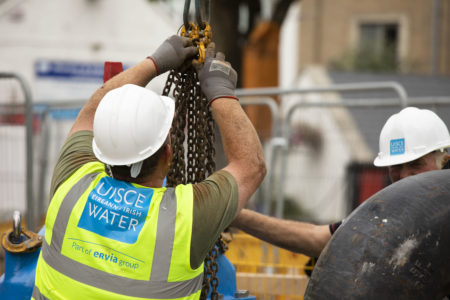29 October 2022
By Elaine Murphy
elaine@TheCork.ie
Irish Water in partnership with Cork County Council has issued a Boil Water Notice for customers supplied by Whitegate Public Water Supply, following consultation with the HSE. This notice is being issued as a precautionary measure to protect the health of approximately 9,500 customers due to increased turbidity in the raw water source as a result of recent heavy rainfall. This may have compromised the disinfection process at the water treatment plant which makes the water safe to drink.
Areas impacted include Aghada, Churchtown, Ballycotton, Saleen, Shanagarry, Ballinacura and areas of Cloyne. Customers can check if their property is included by visiting the Water Quality section of www.water.ie and entering the property’s Eircode or by calling the Irish Water customer care helpline, open 24/7, on 1800 278 278. A map of the area is attached and available to view on the supply and service section of water.ie.
Drinking water experts from Irish Water and Cork County Council are working to rectify the turbidity issues at the treatment plant and lift the notice as quickly and as safely as possible, in consultation with the HSE. Irish Water is also progressing a permanent solution to address the issues in the long term. This involves a major upgrade of the water treatment plant that will ensure a safe, reliable drinking water supply to customers on the Whitegate Regional Public Water Supply.
In the meantime, all customers on this supply are advised to boil water before use until further notice.
Irish Water’s, Pat Britton, regrets the inconvenience to impacted customers, adding, “Public health is Irish Water’s number one priority and we would like to assure customers that the notice has been put in place to protect public health. There have been previous water quality issues on this supply and we acknowledge the inconvenience caused to homes and businesses and would like to assure customers that we are working to resolve the issue and lift the notice as quickly and as safely as possible.”
In line with HSE COVID-19 advice and the requirement for frequent hand washing, Irish Water advises that the water remains suitable for this purpose and boiling the water is not required for handwashing.
Irish Water’s drinking water standards, as per EU Drinking Water regulations, are strict and include wide safety margins. Where risks to water quality are identified through Irish Water’s enhanced testing and monitoring programme, the Health Service Executive (HSE) are consulted and Boil Water Notices are issued to protect public health. In all instances immediate action is taken to address the cause of the issue to enable the lifting of the notice as quickly as it safe to do so, in agreement with the HSE.
Vulnerable customers who have registered with Irish Water receive direct communication on Boil Water Notices. Customers are reminded that the water is safe to consume once boiled.
Water must be boiled for:
- Drinking;
- Drinks made with water;
- Preparation of salads and similar foods, which are not cooked prior to eating;
- Brushing of teeth;
- Making of ice – discard ice cubes in fridges and freezers and filtered water in fridges. Make ice from cooled boiled water.
What actions should be taken:
- Use water prepared for drinking when preparing foods that will not be cooked (e.g. washing salads);
- Water can be used for personal hygiene, bathing and flushing of toilets but not for brushing teeth or gargling;
- Boil water by bringing to a vigorous, rolling boil (e.g. with an automatic kettle) and allow to cool. Cover and store in a refrigerator or cold place. Water from the hot tap is not safe to drink. Domestic water filters will not render water safe to drink;
- Caution should be taken when bathing children to ensure that they do not swallow the bathing water;
- Preparing Infant Formula: Where a Boil Water Notice is in place, you can prepare infant formula from tap water that has been boiled once (rolling boil for 1 minute) and cooled beforehand. Bottled water can also be used to make up infant formula. All bottled water, with the exception of natural mineral water, is regulated to the same standard as drinking water. It is best not to use bottled water labelled as ‘Natural Mineral Water’ as it can have high levels of sodium (salt) and other minerals, although it rarely does. ‘Natural Mineral Water’ can be used if no other water is available, for as short a time as possible, as it is important to keep babies hydrated. If bottled water is used to make up infant formula it should be boiled once (rolling boil for 1 minute), and cooled in the normal way. Ready-to-use formula that does not need added water can also be used.
Great care should be taken with boiled water to avoid burns and scalds as accidents can easily happen, especially with children.
Updates are available on our Water Supply Updates section on water.ie, on Twitter @IWCare and via our customer care helpline, open 24/7 on 1800 278 278.
Additional Links and information:
- Boil Water notice webpage: https://www.water.ie/water-
supply/water-quality/boil- water-notice/ - Using water during a Boil Water Notice Video: https://youtu.be/7rvA63Cwaic
Notes
A detailed scoping of the new treatment plant has been completed and a contractor has recently been appointed, under our Early Contractor Involvement Framework, to undertake the design and construction. The proposed works will include a new coagulation, flocculation and clarification system, a new filtration system and a new disinfection system.
Significant upgrades will be made to other aspects of the Kilva Water Treatment Plant site. Due to the nature of the project, land acquisition, planning approvals and other legal consents may be required, and the timelines indicated are reflective of this. The design process has commenced and is due to be completed by the end of 2022. Following that, the project will enter the Detailed Design phase. Irish Water is targeting early 2023 for the submission of a planning application to Cork County Council, if required.
Subject to the planning process, it is anticipated that construction would commence on site in 2024. However, as with all projects where some level of land acquisition, planning etc. are involved, timelines can be difficult to predict. Further updates will be provided as the project progresses.


